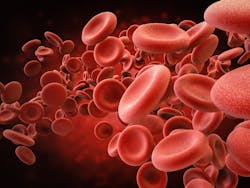New blood product combining RBCs, plasma associated with improved survival after trauma
A new blood product that combines red blood cells and plasma in one bag is associated with better survival from a penetrating major trauma injury compared to RBCs alone, new research suggests. A team of investigators from the United Kingdom’s NHS Blood and Transplant, Queen Mary University London and Barts Health NHS Trust collaborated on the new study published in Critical Care.
In this multicenter observational cohort study, investigators compared mortality at 24 hours and 30 days between 909 patients with major traumatic hemorrhages. Patients received prehospital transfusions of the new product, which contained equal parts leukocyte-depleted red cell and plasma (RCP, 295 patients); RBCs and plasma (RBC+P, 391 patients); or RBCs alone (223 patients). Patients in the RCP arm received a median of two units of RCP while patients in RBC+P arm received a median of one RBC and one plasma unit. Those in the RBC arm received a median of two RBC units.
Among patients who survived to the hospital, the RCP arm and RBC+P arm were associated with lower mortality risk at 24 hours compared to RBCs alone (adjusted odds ratio [aOR] 0.69 and 0.60, respectively). For 30-day mortality, the multivariate regression analysis showed no association between RCP (OR 0.84) or RBC+P (OR 1) with survival compared with RBCs alone. The lower mortality risk for RBC+P and RCP versus RBC were driven by penetrating injury (OR 0.39 and 0.22, respectively) and not blunt injury (OR 1.03 and 0.94, respectively); however, investigators said that future randomized controlled trials are needed to confirm these results.
Based on the results of this study, the logistical advantages of the RCP arm did not translate into clinical benefits. Investigators believe this is likely due to the same transfusion content of prospective arms in this study. Furthermore, any potential benefits from shortening the prehospital transport time (if they exist) might be too small to detect.





